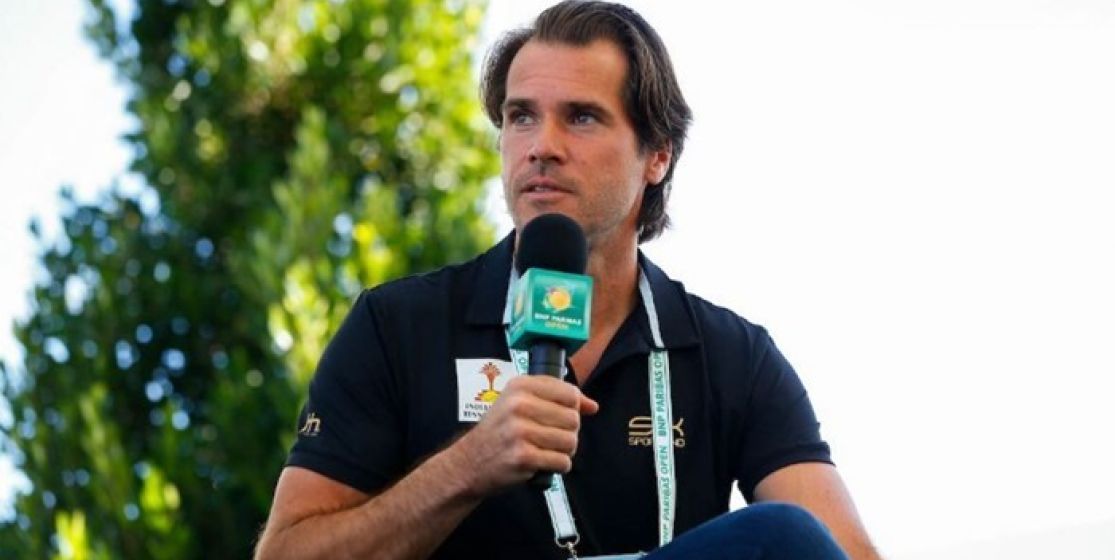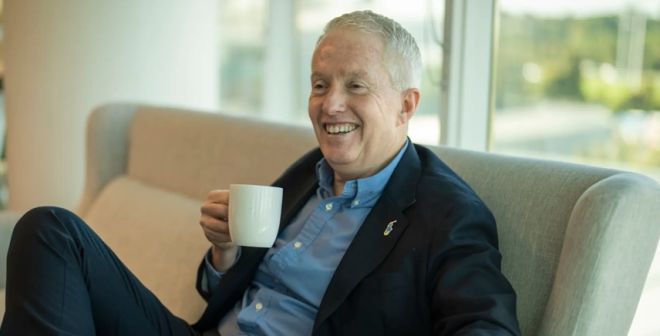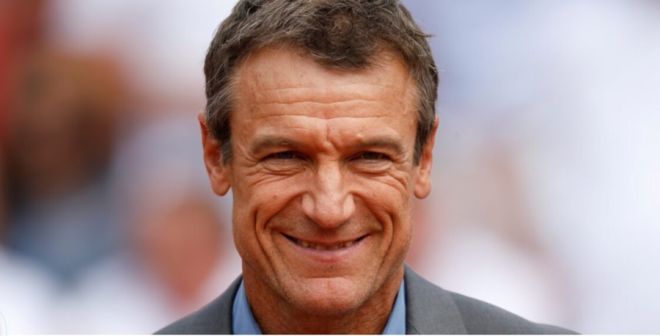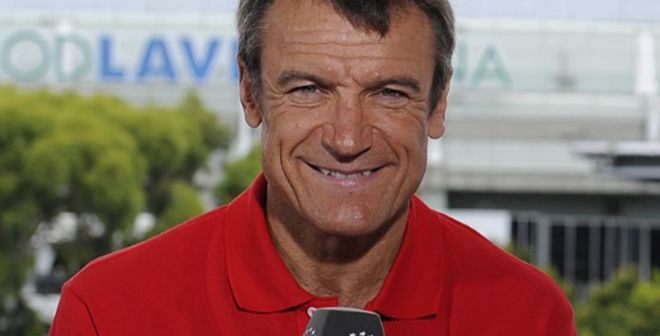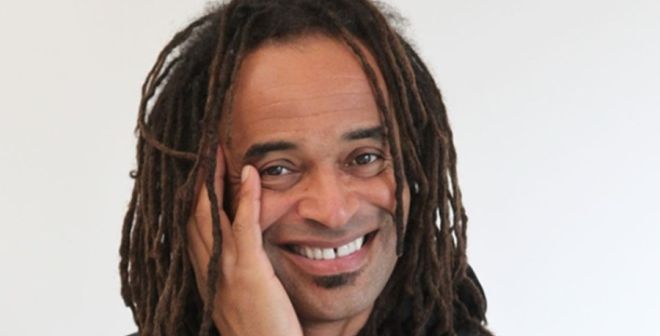Q: Indian Wells the BNP Paribas Open and the Miami Open were both started by tennis champions and now you as a tennis player is carrying on that legacy; daunting or thrilling?
HAAS: Thrilling for sure. I think when you pursue a childhood dream at a young age wanting to become a tennis professional and you are capable of or able to make that dream come true and travel the world for many, many years, trying to achieve your dreams, is amazing. Some of them in my career for instance, I didn’t achieve the big dream of winning a grand slam, but I did have a spectacular career looking back, that I am very proud of. So, you wonder after tennis which direction you are going to go and for me to say I am a part of the BNP Paribas Open at the Indian Wells Tennis Garden, and of this amazing team who have done such a great job over the years to create and see what it is today, is absolutely thrilling.
Q: Do you prefer to be called a player or a former player?
HAAS: I never really thought about that to be honest. Both work for me. I guess because in many ways I am a former player, that’s how I look at myself. I still enjoy playing and lucky enough, because of the career I have had, to be invited to some of the legends events across the globe; the slams for example – the Australian Open, Wimbledon even U.S. Open, French, at times, so it’s fun to a part of that and you feel like when you get to be invited these beautiful venues and places where the history is, where the great sport of tennis is, it is a privilege, so I still feel like a player it is totally awesome. I will always be a player at heart. I love this game. I try to play as much as I can. It’s good for the soul, good for the mind to shut off completely, I do quite well. As a tournament director here as well while still in my mid-40s and in good shape, I still get asked to play sometimes. I had the chance to play with Jannik Sinner which was a thrill for me. To have those videos and pictures is something that is quite cool.
Q: What’s tougher being a player or a tournament director when you consider the pressures and things like that?
HAAS: It’s a different combination, I think. The responsibility of being tournament director and the thoughts you have that includes everyone. You want to make sure all the players are taken care of, they’re comfortable and that includes their teams. You want to make sure the red carpet is there for them, which they’re used to in many ways; they are the stars of the show. That’s why we have sponsors and the fans come out – even fans and sponsors, you want to take care of as well and they have a great experience. I always look at it is if you are a fan or guest coming here it’s like going to a nice vacation. That when people leave, they feel they’ve been treated with respect. It’s nice the surroundings are beautiful - the Indian Wells Tennis Garden is such a spectacular sight. We are always trying to entertain the crowd besides with just the tennis. It’s a big responsibility for a shorter period of time. Being a professional tennis player there are so many other things you have to take in. You are somewhere different every other week, the conditions are different all the time, so I get that part as it can be very stressful; are you fit and ready and confident to do well but also having to deal with adversity that can be tough mentally, so I am proud of the many different comebacks I have had.
Q: What do you miss the most as a player and what do you miss the least?
HAAS: I think the noise, the applause and thrill of going out on the big stadium courts and right before you get to like match point, that feeling of I’m about to close it out and that walk to the net when you win. It’s a thrilling feeling it’s excitement and you feel like all the hard work that nobody sees or cares about is paying off and that’s such a thrill. That I miss the competitive side, hearing the noise, the applause those thrilling matches but in the other side you have to put a lot of work into it and it’s hard work and depending on how much you want it and how much you want to achieve. It’s tough and gruelling and it takes dedication and discipline. Some days, weeks you have it and other weeks you don’t but stay with it, that’s the tough gruelling part.

Q: What’s one of the biggest memories you take away from your playing days?
HAAS: There are so many incredible matches that come to mind. Some of my idols, going out against them, Agassi playing him, or even Pete Sampras, stuff like that. Those were highlights early in my career. Winning your first title. Winning a silver medal at the Olympics, getting to semis in the grand slams but there’s also a lot of missed opportunities. As a tennis player you criticise yourself quite a lot. You see it all the time – you’re hitting ten forehand shots; you make nine and miss the last one and you say why did you miss that last one? Being able to say having done it for so long I truly enjoyed the part that brings everything with it as a tennis professional. I look at it now with all the tournaments doing such a phenomenal job, the growth is incredible. Just happy to say I’ve done it for a long time.
Q: What about the frustrations? Maybe considering what you wanted to do and maybe didn’t do or wasn’t able to do?
HAAS: At the end of the day that’s all you can say, the frustration for me was not winning a slam. You can ask why didn’t it happen for me? I made it to the semifinals four times. You try to dissect those matches and you look at the ones where you did have a chance and whether you were outplayed or didn’t play your best and so on. That’s really all. It’s easy to say if I could turn back time. I’d be happier if I’d been more mature or with more experience earlier on at a younger age in order to pursue those dreams, but I wouldn’t have changed anything. My career was quite interesting, my dad teaching me tennis and then going to Bollettieri Tennis Academy in Florida, leaving Germany at age 12 trying to pursue my dreams there, turning pro at 18 after I got my high school degree. Everything was in place, and I played by the book and believed and knew that was going to be my path. When you have those dreams as a young boy of holding up those big trophies, most want to hold up that Wimbledon trophy and it doesn’t happen, you have to accept it and say I tried my best and now you just watch other people hold it up every year.
Q: What do you think has surprised you most in the role as a tournament director that you wouldn’t have considered in your playing days?
HAAS: It’s incredible to see what goes on behind the scenes the whole year. Just to try to make positive changes with the players and fans, keeping up with new technology, making sure of security, and food and beverage is good et cetera. I think for some players to just dive into that scenario for two or three days to see what goes on behind the scenes, might realise maybe I shouldn’t be complaining about certain things. Our goal is when they come here is to make sure everything is tiptop and usually it is, that’s why we’ve been voted Best Masters 1000 ATP and WTA for the past nine years. You’re obviously doing something right and keep learning from other great events to do better every year. It opens up your mind as a player. It probably would have helped me too and I would have seen that earlier on and respected certain things a bit more. Just mannerisms. For me now to give out while cards and do scheduling and try and understand player’s preferences et cetera. And if the guys and ladies get wild cards then send an email or come to the office and say thanks for wild cards. It goes a long way. I wish I had done that more as well and I learnt that a bit later in my career, so I appreciate those things.
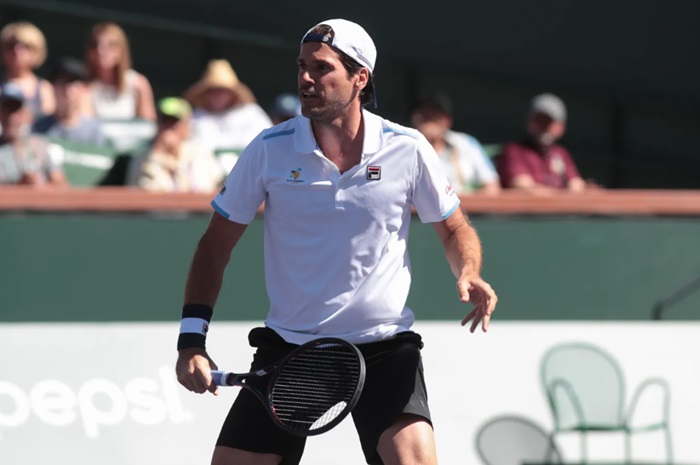
Q: You have a young family. How have they adapted to you in this role as a tournament director and also consider so many more players at their peaks are travelling with families and young children. Could you have done that at your peak?
HAAS: That attributes to the fact that tennis is one of the most popular sports in the world and the financial part of it as well is seeing prize money being increased in the past ten years. Every player is different. Some love to travel with their families, some might need a bit of distance to focus on what’s at hand, depending on the kids ages whether there are at school or homeschooled – so many different scenarios and everybody has to decide for themselves. For me, I was super, super motivated to keep playing. I became a dad at 32 when I had hip surgery and thought I’d be out for a year so I was there for the whole process with Sara when she gave birth, and I had the thought it would be amazing if my daughter can watch me play and see what I did for a really long time and I made that happen. Visions and goals can move mountains at times.
Q: What do you want to see happen in world tennis? What do you want to see changed or stay the same, and do you feel the sport, as a whole, is in a pretty healthy state or there’s a long way to go?
HAAS: I think it is in a very healthy state. You look at tournaments all around the world and look at which directions they have gone, it’s pretty spectacular. One thing I’d change potentially right now, I think I’d get rid of lets. If I was still a player I may have doubts about it, but as a spectator, as a viewer every time a let is called, I think come on just play.

Q: Personally, what do you still want to achieve?
HAAS: I want to help grow this great event here in Indian Wells potentially see it become a slam down the road, that would be something really cool. Besides that, obviously be the best dad I can be for my kids, stay healthy and enjoy life. Every year goes by faster and faster as we get older. We are lucky to be here and show a lot of gratitude and appreciate what life has given me, so just enjoy.
Q: And finally, you have some sort of pedigree with music, your father-in-law is David Foster, and you were part of the Single-Handed Backhand Boys. Do you want to give some notes of Hard To Say I’m Sorry by Chicago as you, Roger and Grigor did?
HAAS: I shouldn’t be singing right now but yes that’s for sure. We still get a lot of people asking us sometimes over social media will there be another song from the One-Handed Backhand Boys. Obviously with Roger and Grigor we have some really strong one-handed backhand players and others can potentially join; Wawrinka, Gasquet, how much longer they play … there’s a lot of interest in having the One-Handed Backhand Boys band grow. Of course, we have super, super major luck with having my father-in-law David Foster who can fine tune a little bit, but he said they haven’t made the technology yet in order for us to sound better because it’s pretty awful, but we had a lot of fun with it. We should be doing it again at some point but it’s just a matter of can we all be at the same place at the same time. We will and I can’t wait for it to happen.
More information about
Players

Roger Federer

Stan Wawrinka

Grigor Dimitrov

Jannik Sinner

Richard Gasquet


